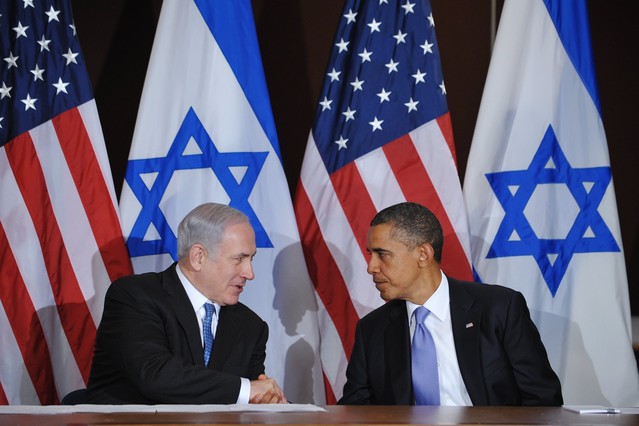|
Israel and the U.S.: Iran not working on a nuclear weapon
By Daan de Wit
Translated by Ben Kearney While the world is getting the impression that a war with Iran has drawn a few steps closer, representatives of Israel and the U.S. are making some remarkable statements about the Islamic Republic. These statements are remarkable in part because, at the same time, the build-up to a military confrontation would seem to be continuing apace. While Iran test fires missiles and threatens to close the Strait of Hormuz, Europe and the U.S./Israel are meanwhile putting new sanctions against Iran in place and are proposing others, and assassination attempts are being carried out on Iranian nuclear scientists. It is part of a battle that more recently has been waged with the forthcoming elections in mind, both in Iran and especially in the U.S. 
While keeping one eye focused on the presidential election contest and the Israeli lobby, President Obama wants to avoid coming off as too measured when it comes to Iran. This also applies to the Republican presidential candidates - with the exception of Ron Paul. To these candidates, a nuclear Iran is likewise unacceptable. But when it comes to the presumed consequence of taking such a position - the bombing of Iran - U.S. Secretary of Defense Leon Panetta was notably less enthusiastic last November: an attack would set back the Iranian nuclear program by only three years at the most. On the subject of Iran, Panetta is quite clear: 'Are they trying to develop a nuclear weapon? No. But we know that they're trying to develop a nuclear capability, and that's what concerns us. And our red line to Iran is, do not develop a nuclear weapon. That's a red line for us', said Panetta while speaking earlier this month. Despite his unambiguous language, not everyone had the chance to hear that Iran is not currently engaged in the development of a nuclear weapon: viewers of PBS Newshour got a much different impression. Newshour edited out the first part of Panetta's sound bite, instead airing the clip from the point at which he says 'But we know that [...]'. 'So Panetta's statement--that Iran is not building a nuclear weapon--is being used to argue that the United States disputes Iran's long-standing contention that it not building a nuclear weapon', writes FAIR. Those who listen to what Panetta says and who are also aware of the facts know that a war with Iran should simply be out of the question. Yet this is still what dominates the news. That’s because facts so often take a back seat to rhetoric. One example of something that got drowned out by the rhetoric was this recent statement by Dan Halutz, the former head of the Israeli Defense Forces: ‘Iran does not pose an existential threat to Israel.' Halutz has also sought to qualify some of the harsh statements made by his colleagues, including Israeli Prime Minister Netanyahu and President Peres, when saying: 'I don't think there's room for any doomsday scenarios or comparisons with the Holocaust. I also don't think Israel should be the one to lead any operation against Iran.'
DeepJournal
Sign up for the free mailing list. |
|
9 September 2013
Why is Syria under attack? - Part 4
‘Syria’ is about power, money, influence and energy
8 September 2013
Why is Syria under attack? - 3
Syria and Iran are like pieces on a geopolitical chessboard
7 September 2013
Why is Syria under attack? - Part 2
On the interests of the parties involved in the Syrian conflict and the role of the media
6 September 2013
Why is Syria under attack? - Part 1
Who is behind the chemical weapons attack in Syria?
1 April 2013
Albert Spits: Creëer je eigen financiële veiligheid
Beluister het interview
|




 Barak’s most recent
Barak’s most recent